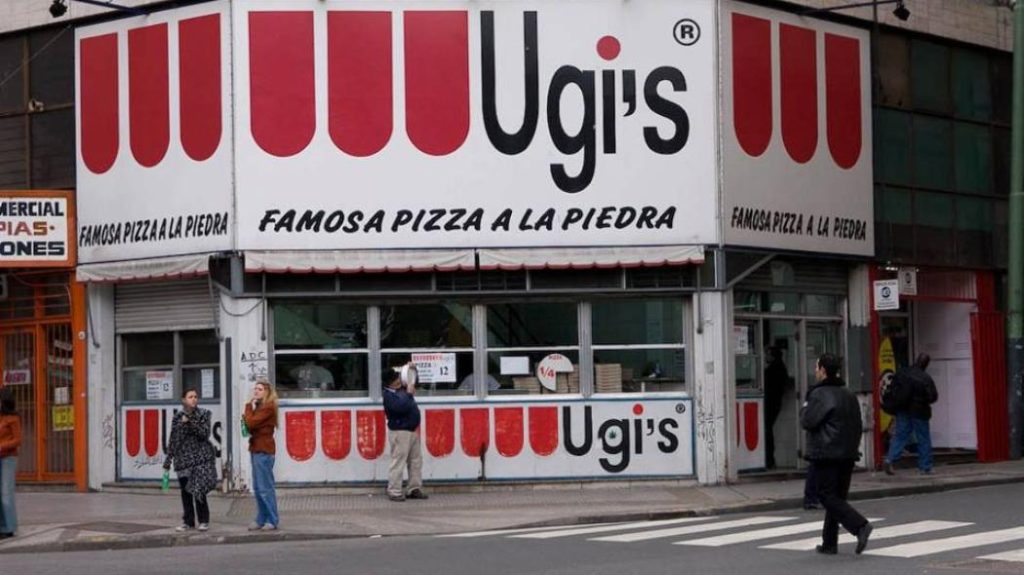 Originally published on MUNCHIES.
Originally published on MUNCHIES.
Argentina’s worst pizzeria has certainly made a name for itself on the Internet. To demonstrate the online popularity of Ugi’s, Argentina’s budget pizzeria, I went down a deep dark Facebook rabbit hole to sort through years of degrading posts and comments, to investigate the offensive, insulting and degrading social media strategy—all to its customers’ delight.
“No to drugs, yes to pizza.”
That’s the slogan stamped on the pizza box at Ugi’s, Buenos Aires’s legendary pizza chain famous for its budget pizza and cult following. Pizzerias line just about every block of Argentina’s pizza-loving capital, a country where more than 60 percent of the population is of Italian descent, but no other pizza shop has made a name for itself quite like Ugi’s. Since it opened in 1980, Ugi’s Pizza became a hit for its central locations, bare-bones ambiance, and affordable pizzas.
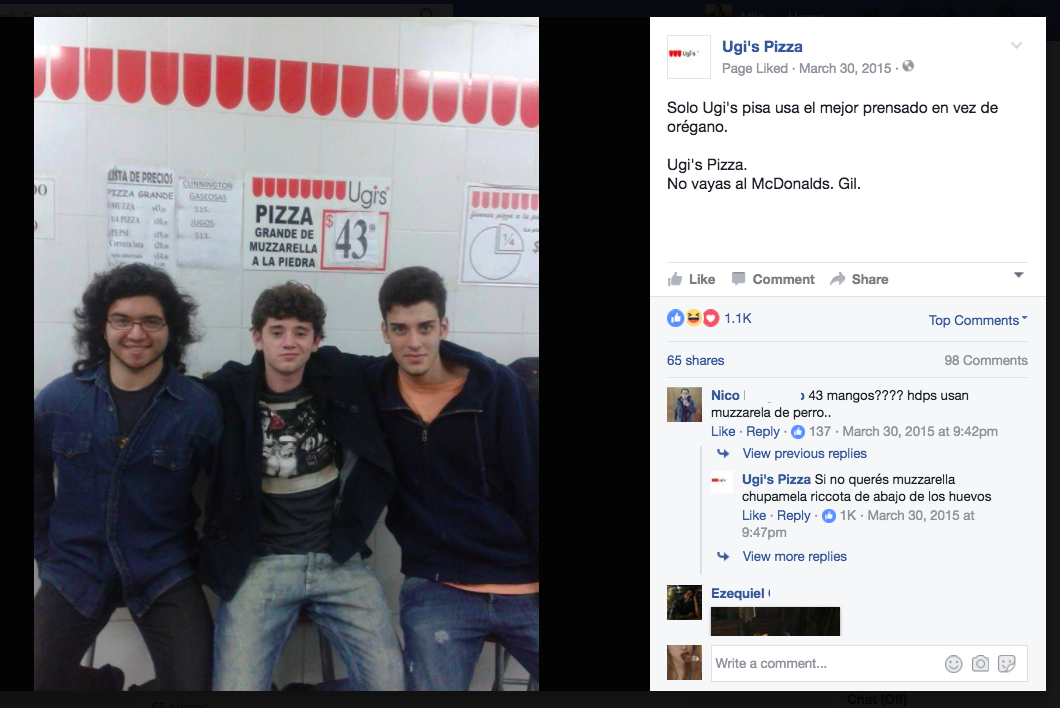
In English, the caption reads: “Only Ugi’s pizza uses the best brick weed instead of oregano. Ugi’s Pizza. Don’t go to McDonald’s. Asshole.” “43 pesos???? You sons of a bitch use cheese from dogs,” writes a commenter. “If you don’t want mozzarella, suck on the ricotta from behind my balls,” Ugi’s responds.
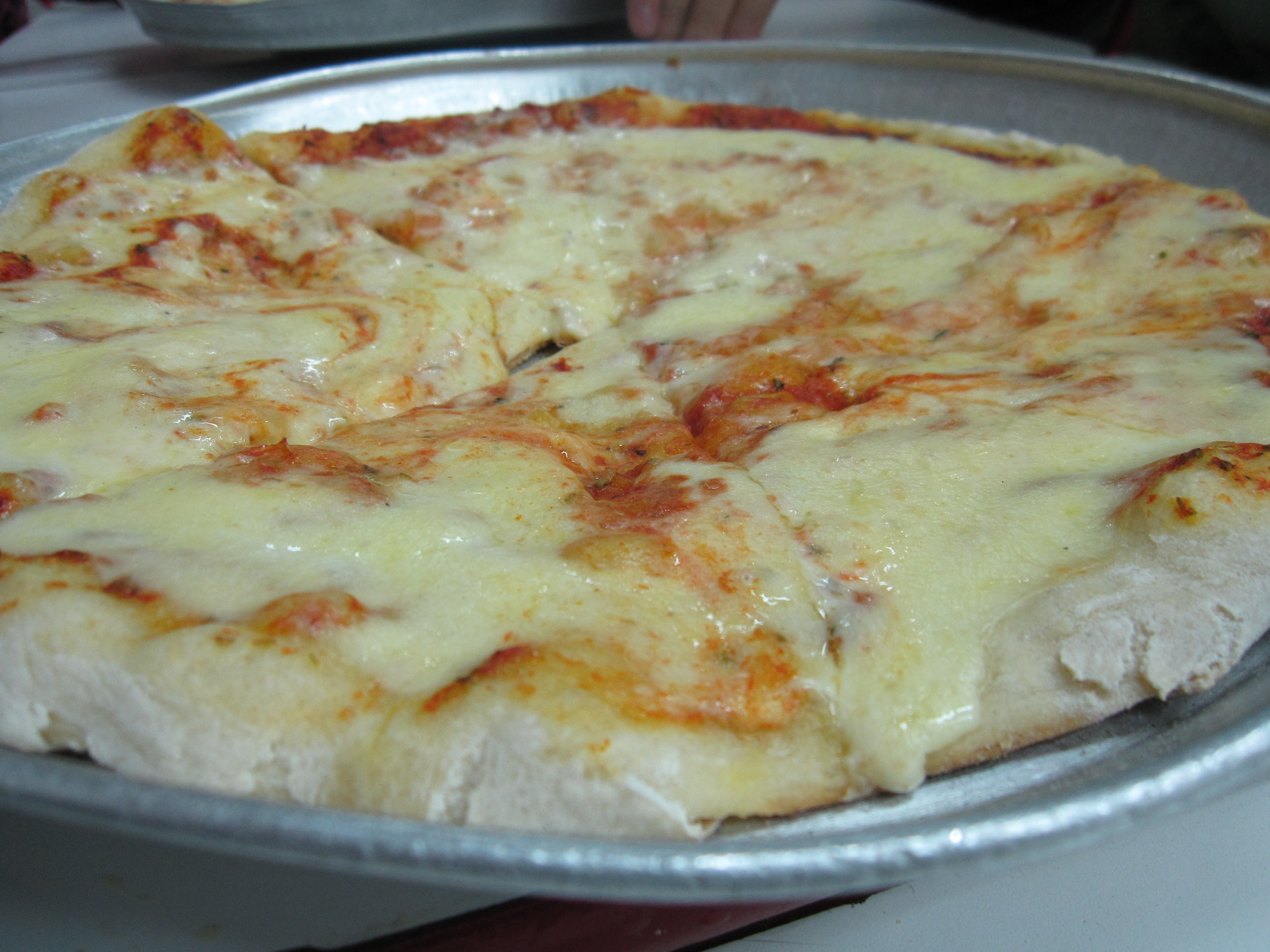
“Ugi’s was everywhere. It was always open and very cheap,” Marcela Basch recalls. Basch was the only journalist who managed to get an exclusive interview with one of the elusive owners—Hugo Sergio Solís Jr. in 2009.
Today, there are more than 30 Ugi’s locations across Buenos Aires, plus related chains—like Don Hugo, Big Muzza, Peli’s, Soffly’s, and Hoogy’s—all rumored to be opened by the sons of the late Hugo Solís. Most serve the same two pizzas: muzza (cheese) and cebolla (onion) pizza, in large or quarter sizes. The large cheese pizza costs about AR$79.99 (about US$4.88), while the quarter pizza is priced at AR$19.99, (about US$1.22). In fact, Ugi’s prices became a gauge for the strength of the Argentine economy, and many referred to it as the most accurate index of inflation.
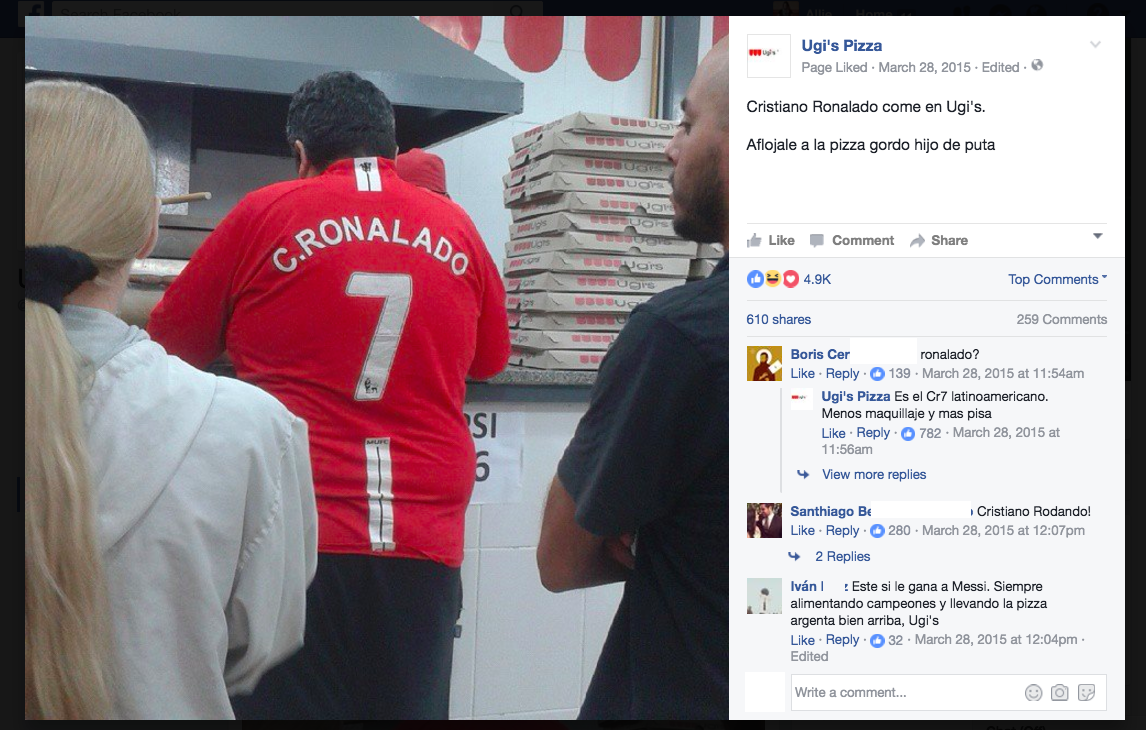
“Cristiano Ronaldo eats at Ugi’s,” this caption reads. “Put down the pizza, fat motherfucker. “
The legend of Ugi’s began long before the inflation index, viral memes, and the existence of Facebook. In 1998, Ugi’s had a major cameo as the go-to pizzeria inPizza, Birra, y Faso, a popular Argentine film about two impoverished teen criminals, and from there, its anti-establishment misfit persona was born.
“This is when they really let their bizarre flag fly, a reflection of what we see today on social media. Ugi’s was never ashamed to be considered cheap; in fact, they were proud of it and absolutely unapologetic,” Banchero points out. “Ugi’s could never compare with the city’s great pizzerias in term of quality and tradition, so it went down its own path.” Ugi’s attracted a whole generational subculture, vocal in their opposition to snobbery, and communicated with them through self-deprecation, pop culture references, shocking language and offensive jokes.
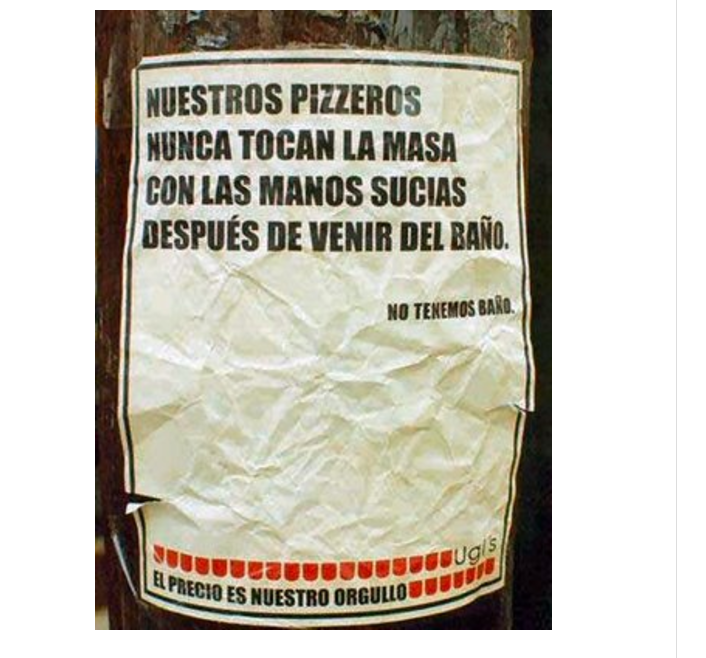
“Our pizza makers never touch the dough with dirty hands after coming from the bathroom. We don’t have a bathroom.”
No one has been able to clarify how Ugi’s “ No to drugs, yes to pizza” motto began, but the slogan took off and transformed into its own beast.
“Ugi’s tone, their jokes, this isn’t something new,” journalist and admitted Ugi’s aficionado Nicolás Lantos tells me. “This similar tone like on the pizza box has been taken to the extreme on Facebook, bringing the same ideology as always, but this time using basic tools like Photoshop or Paint.” Because of its generational Argentine humor, which especially captured millennials, Lantos believes that the page alone gained fans who might not even consume Ugi’s pizza, but enter to participate in its antics.
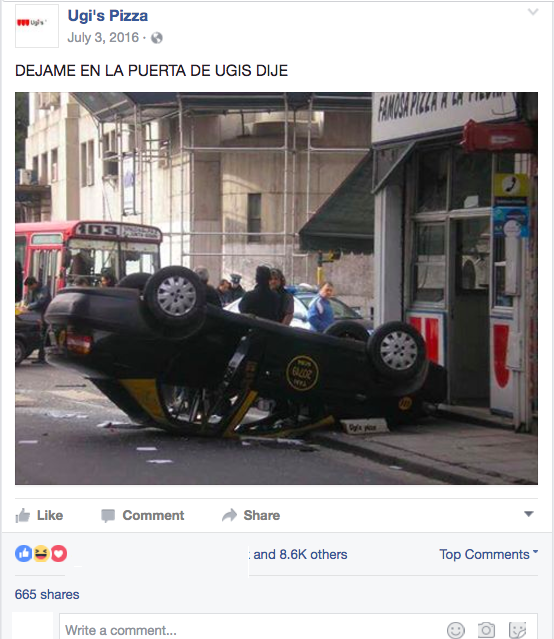
“Drop me off at Ugi’s door, I said.”
One ongoing gag is an open acknowledgment that many Ugi’s locations aren’t particularly clean; pigeons so often infiltrate the stores that they’ve named the symbolic Ugi’s pigeon “Miguel” and include him in posts periodicially:
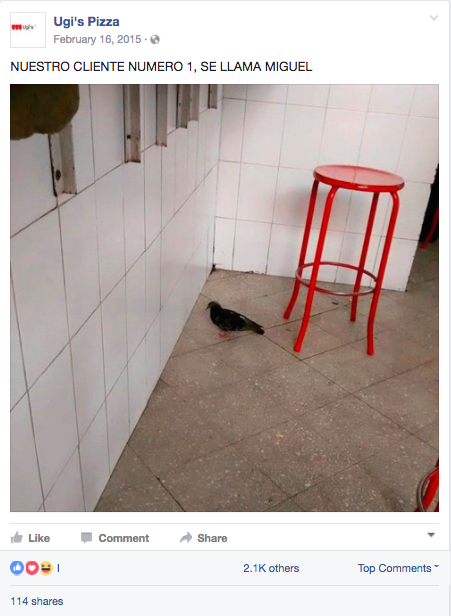
“Our number 1 client: His name is Miguel.”
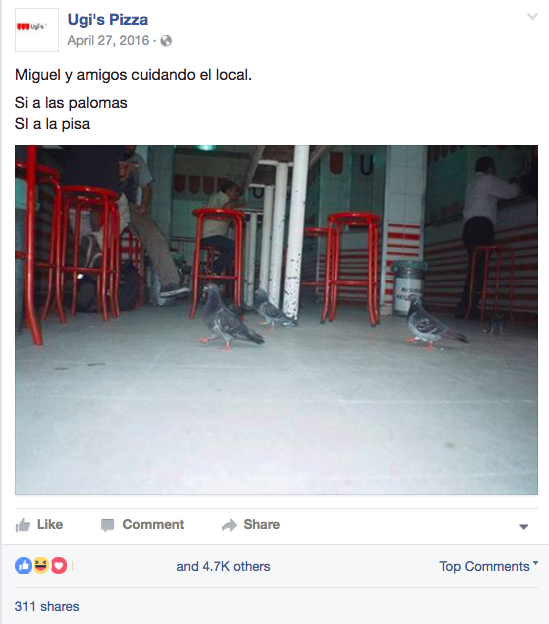
“Miguel and his friends taking care of the store. Yes to pigeons, yes to pizza.”
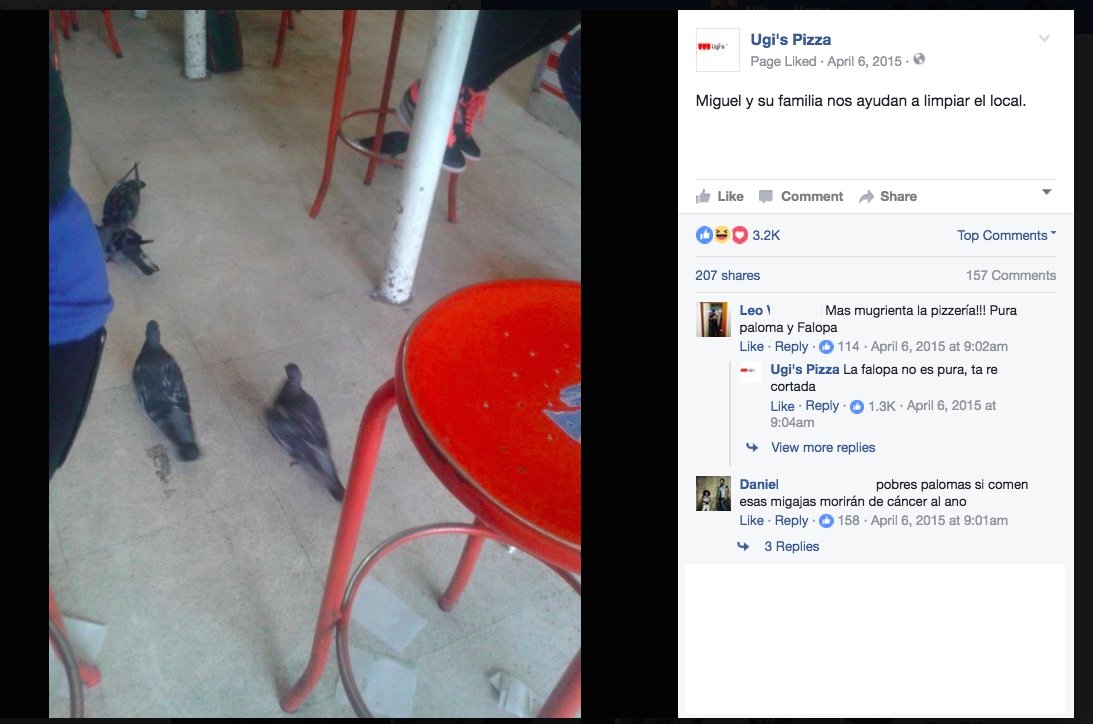
“Miguel and his family help us to clean the store,” says the caption. “The pizza is dirtier. Purely pigeons and cocaine,” a “fan” writes. “The cocaine isn’t pure, it’s cut,” Ugi’s responds.
“The Ugi’s fanpage is an unfiltered, genuine, and ingenious space in which the traditional roles of consumer and brand communication are reversed,” explains Tomás Balmaceda, a writer who specializes in pop culture. “Generally, we see angry consumers who complain [to] a restaurant about bad service, and the restaurant has to respond in a cordial way. But here, however, the company is the one who responds with fury, and in turn, the consumer rebuttals with the same currency.”

“Your pizzas taste like ass.” “The best pizzas.” “Your pizza’s taste like grandpa’s puke.”
The Ugi’s fan page opened the vulgar floodgates, welcoming a community of trolls and haters who regularly engaged in misogynistic, politically incorrect, and homophobic exchanges, adopting a persona of the “yo mama” joke-teller. Despie its machista attitude, many Argentines are not offended. “I don’t think these people are malicious,” Lantos remarks. “It’s just a certain sense of humor from a younger generation who want to show they aren’t careta (snobby, or a fake).” Banchero agrees, citing that Ugi’s fans are in on the joke, and together work under the same code of understanding.
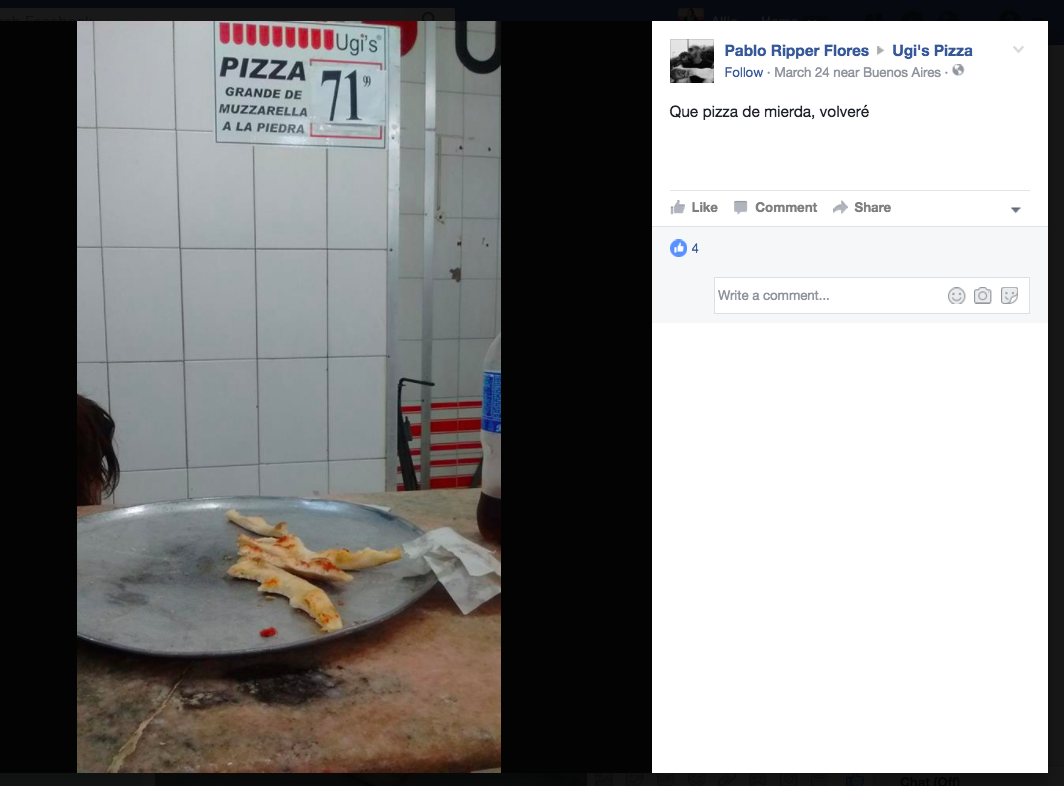
“What shitty pizza, I’ll be back.”
“Ugi’s appeals to a certain type of dark and absurd Argentine humor. If another pizzeria acted the same way, it would create chaos. But here, Ugi’s is speaking the same language as their consumers.”
Leave a Reply